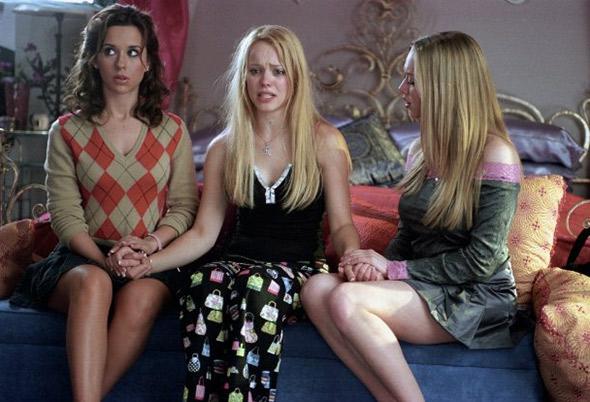It’s the 10th anniversary of Tina Fey’s classic comedy, Mean Girls, and the Internet has exploded with appreciation for the teen genre gem. The New Yorker’s Richard Brody explains that the movie is a classic because of the “superb actors” who deliver their lines with “three-dimensional authority, like mobile language-sculptures.” Indeed, the performances are fantastic, and the script is superb. But equal credit must be given to another reason why Mean Girls endures: As its title promises, it is deeply, sometimes breathtakingly, always hilariously, mean.
In an interview with the New York Times’ Megan Angelo, Tina Fey says that she promised Rosalind Wiseman, the author and educator who wrote the book on which Mean Girls is based, that the movie would have a positive core. And yes, Fey’s character, a math teacher, does give a nice speech toward the end of the movie about why girls shouldn’t call one another sluts. But that’s not what most people take away from it. The lines we all remember are the clever verbal daggers thrown by the various high-schoolers at others and themselves, which include, but are not limited to, “Boo, you whore”; “Stop trying to make fetch happen!”; and “I can’t help it if I’ve got a heavy flow and a wide-set vagina.”
Unlike, say, John Hughes, whose ’80s teen characters were much less cutting and much more vulnerable, Tina Fey has always had a darker view of adolescence. Take one of my favorite episodes of 30 Rock, “Reunion,” from season 3. At the beginning, Fey’s character, Liz Lemon, says she hated high school because she was a loser and the popular girls were horrible to her. Later, we find out that Liz was actually awful to the popular girls, mumbling things like, “I don’t know, Kelsey, how’s your mom’s pill addiction?” in response to an innocuous question, and telling the homecoming queen that her mole made it look like God pooped on her face.
Mean Girls endures for a new generation of teenagers and young adults because it has that same dark, realistic beating heart. Kids are cruel. Most unknown sophomore girls don’t get asked out by supreme senior hotties, like Molly Ringwald’s character does in Pretty in Pink. Most unknown sophomore girls do say mean but privately hilarious things from time to time, because they’re just trying to survive the high school jungle, and they’re only human. As Priya Elan put it in the Guardian, “This battle for ‘social acceptance by any means necessary’ is something that continues to be played out in real life.”
Though the ending of Mean Girls is a happy one—the girls stop calling one another names and end up channeling their negative energies into more productive callings—it always rang a little false to me. Maybe Fey was hamstrung by her promise to Wiseman to give the movie a positive bent. Maybe film executives thought the movie wouldn’t be popular if it didn’t end on a high note.
Fey’s real worldview is more apparent in the ending of 30 Rock’s “Reunion” episode. Liz Lemon’s classmates conspire to dump a bucket of animal blood on her head, Carrie-style. Lemon narrowly avoids this fate, and on her way out tells all her former classmates to, “Suck it you whittling IHOP monkeys!” before throwing down the microphone and running back to New York. It isn’t nice at all, but it sure is funny.
